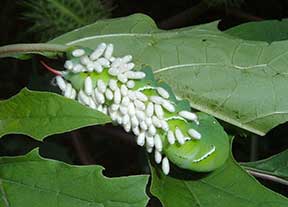 |
Previous Issues |
| Cedar Mill Community Website |
|
Search the Cedar Mill News: |
About The Cedar Mill News |
|
|||||||
| Volume 15, Issue 8 | August 2017 |
||||||
Watch those wasps – most are garden helpers
|
|||
 |
Solitary wasps are generally small and may go unnoticed except when visiting nectar plants. Take a magnifying glass into the garden and watch them enjoying a meal.
Wasps are part of nature’s natural balance. When we refrain from using broad spectrum insecticides that kill every bug, we encourage that balance. Interestingly, harmful insects multiply more rapidly than beneficial ones, which means pest populations rebound quickly and devour our vegetables and ornamentals after the poison you put out disperses. Parasitic wasps are our garden pest control partners and help to keep damage to a minimum — if they are allowed to do their job.
The two most important ways to invite these helpers into the garden are: don’t use broad spectrum insecticides that kill indiscriminately, and plant flowers that provide nectar for the adult wasps. Flowers like cosmos, zinnias, sweet alyssum, lobelia, and lemon gem marigolds are excellent choices. Many herbs like catmint, dill, parsley, and thyme are also great nectar providers.
Wasps are also pollinators, increasing the bounty from our vegetables. If we don’t disturb them they won’t bother us, but will go about their work keeping our gardens nearly free of bugs that eat our plants.
[Ed. Note: the Lemon eucalyptus oil we recommended last month has proven to be effective in keeping aggressive wasps away from picnic tables when sprayed around the perimeter of the eating area!]
Questions? Email me at margierose2@gmail.com or call 503-645-2994.
![]()
Like us on Facebook for timely updates
Published monthly by Pioneer Marketing & Design
Publisher/Editor:Virginia Bruce
info@cedarmillnews.com
PO Box 91061
Portland, Oregon 97291
© 2017